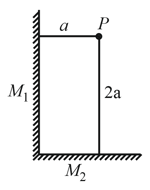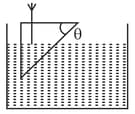Embibe Experts Solutions for Chapter: Ray Optics, Exercise 1: Level 1
Embibe Experts Physics Solutions for Exercise - Embibe Experts Solutions for Chapter: Ray Optics, Exercise 1: Level 1
Attempt the practice questions on Chapter 17: Ray Optics, Exercise 1: Level 1 with hints and solutions to strengthen your understanding. Physics Crash Course NEET solutions are prepared by Experienced Embibe Experts.
Questions from Embibe Experts Solutions for Chapter: Ray Optics, Exercise 1: Level 1 with Hints & Solutions
Two plane mirrors and are at right angle to each other shown. A point source is placed at and meter away from and respectively. The shortest distance between the images thus formed is : (Take )

The refractive indices of the material of the prism and liquid are and , respectively. What will be the value of for the above refraction?

Conditions for total internal reflection to occur are
a) The ray should travel from rarer to denser medium
b) The ray should travel from denser to rarer medium
c) The angle of incidence should be greater than the critical angle
d) The angle of incidence should be less than the critical angle
The principle used in the transmission of signals through an optical fibre is
Optical fibers transmit light signals from one place to another place by
Numerical aperture of an optical fiber is a measure of
A concave glass lens of refractive index is immersed in carbon di-sulfide (refractive index ). Which of the following is true?
[ Assume both surfaces of the lens have same radius of curvature ]
A converging lens having magnitude of focal length as is kept coaxially in contact with a diverging lens having magnitude of focal length as . The focal length of the combination would be:
